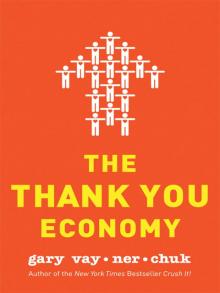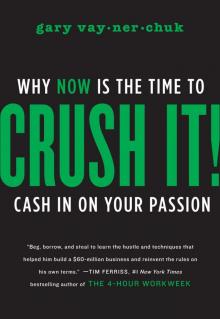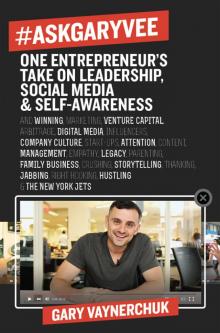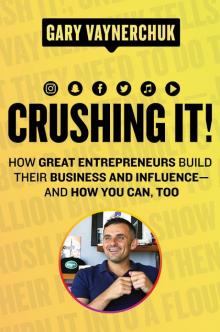- Home
- Gary Vaynerchuk
#AskGaryVee Page 3
#AskGaryVee Read online
Page 3
This moment when you decide what to focus on next is crucial not only because it’s going to help you grow, but also because it could be what allows you to bring in more key players, people who may not be great at selling but are overwhelmingly talented at something else—something else that complements your own talents.
Bet on your strengths. It’s an underrated business strategy in a world where so many people are obsessed with fixing their weaknesses they give short shrift to the skills they were born with.
CHAPTER 2
STARTING OUT
* * *
IN THIS CHAPTER I TALK ABOUT CHOOSING A NAME FOR YOUR COMPANY, MAKING YOUR MARKET CARE ABOUT YOU, AND STANDING UP TO YOUR MOM.
* * *
Sometimes kids ask me questions on The #AskGaryVee Show, and I’m always struck at how much they take all the opportunities at their fingertips for granted. Of course they can get two thousand views for their makeup shows shot from their bedroom. Of course they can just reach out to a seasoned entrepreneur and ask him a direct question. Every time I see their happy, hopeful faces I want to scream, “Do you know how lucky you are? Do you know how much closer I’d be to owning the Jets right now if I’d had access to the Internet back when I was your age?” My God, the things I could have done.
And now more people than ever are doing those things, because that’s the kind of change the Internet has brought on our society. It’s why so many of us can start building something incredible even when we’re just sitting at a makeshift desk in a broom closet. It’s why we’re able to talk to each other, network, reach influencers, find inspiration, and engage at a level unseen in human history. We are all so, so lucky. It’s such an exciting time to be an entrepreneur—heck, to be a human being!—and I’m pumped at how many people are going out into the world with their ideas and their hustle.
I get a lot of questions from entrepreneurial newbies and restarters looking for everything from nuts-and-bolts platform explanations to reassurance that they’ve actually got what it takes to succeed. I try to answer as many as I can because if there’s anyone I know I can help, it’s this group. I often say there are two core things that bring people value: 1) entertainment, and 2) utility. I know this chapter falls in the latter category, and not only for the entrepreneurs just starting out. Old-timers, pros, and establishment icons, don’t pass up this opportunity to see what’s on the mind of the new generation. Even if you think you already know all the answers, you might be surprised. And their questions—not to mention their eagerness, their fears, and their sheer excitement—can be good reminders as to why you decided to hop on this awesome, crazy train in the first place.
* * *
Finding a marketing job out of college is tough, especially one that’s not sketchy. How do you find a job that is the right fit?
* * *
What’s a sketchy marketing job? I can only imagine you’re talking about the lowest common denominator stuff out there, like MLM (multilevel marketing), which relies on a pyramid scheme, or creating landing pages, selling overpriced e-books, or hawking supplements that haven’t been vetted. I can see why you’d think that was dark, bad stuff.
But most of the marketing world isn’t like that. There are plenty of reputable marketing and social media agencies looking for talent, so you need to recalibrate and raise the bar on your search. If you can’t find a quality company to pay you to work for them, apply for an internship so you can prove your chops. At VaynerMedia we’ve been able to offer many of our interns permanent jobs. We’re growing fast so we’ve needed to fill positions, but we also hire when someone proves themselves to us through hustle.
Many internships pay, but if you can’t find a paying position, consider working pro bono and turning that into a great opportunity. You can read about how DRock, my videographer and director, did it in this book. Don’t want to work for free? Well, it seems to me that if you’ve been struggling to get a job for three or four months, it’s a lot more productive than sitting around doing nothing. I mean, who’s paying you to do that? Take a pro bono half day in a place where you can pick up skills, network, learn your craft, and get an employer’s attention (or at least guilt her into recommending you to someone else). Unless you are literally sending out résumés and interviewing eighteen hours straight per day, you’ve got time to volunteer your professional talent somewhere. Find a place where you think you can make doors open, and put your skills into action. We have become too entitled. Go out and earn that job.
* * *
How or should the length limitations inherent on Twitter/Vine/Instagram affect a start-up when choosing its name?
* * *
I frequently get questions from people wanting to know the science to coming up with a great business name. Science? There is no science. People will agonize for hours, weeks, months, trying to figure out the name for their start-up, hunting for that perfect, zingy, creative name that allows them to “stand out” and “disrupt the category.” You want to know how you stand out and disrupt the category? It has nothing to do with your name.
Just stand out and disrupt the category.
Are you going to tell me that “Apple” or “Vine” is an earth-shatteringly clever name? Or “Snapchat” or “Reddit”? Do you know how many people tell me they wish they had a different last name so they could use it for their company? They’re talking to a guy named Vaynerchuk! “Oh, but that’s unique and cool and . . .” No, it’s really not. My name is “good” because I made something out of it.
What did “Google” or “Facebook” mean to anybody when they weren’t the household names we know today? You want people to recognize and remember your name? Earn it. Of course serendipity and good timing can play a big part in any product or start-up’s success, but none of that is even possible without a whole lot of hustle and sweat first.
If you’re really worried about your name taking up too much space in this short-form era, go with an abbreviation. No one seems to care that I’m often signing off as GaryVee nowadays. You can also let your audience abbreviate for you. People will help you evolve your name so long as whatever you deliver brings them value.
Here’s my two cents: Stop worrying about coming up with the perfect name. Yes, a good name carries some marketing power, but at the end of the day if the product sucks, the name means nothing. If you have a clever name, people might stop and notice. If you don’t, they really won’t care. They’re going to assign it meaning based on the experience they have with your brand. So please, stop worrying about your name and start worrying about your product.
* * *
What was the hardest thing about starting up VaynerMedia from scratch?
* * *
I’m asked this all the time, and the answer might surprise you.
It wasn’t leaving Wine Library.
It wasn’t launching a new business with another family member.
It wasn’t jumping into the agency world with zero experience.
It was all the options I had at my disposal.
During the first nine months we were launching the agency I was troubled by the fact that there were about eight hundred other things my brother, AJ, and I could have done together, and it was hard not to look back at all those opportunities and wonder, did we do the right thing? In addition, that same year my daughter Misha was born and I published my first business book, Crush It. There was so much going on—was this venture the best use of my time? The second-guessing was brutal.
You’ve surely experienced this kind of buyer’s remorse after making a big decision. Almost everyone has. Kids when they finally pick a college. Managers when they make a hire. Entrepreneurs when they invest. Because you know that there’s always that chance you messed up and missed the next big thing. The perfect school. The perfect hire. The monster dividends. We all have our #onealmond moment. (Not familiar with it? I talk about it in Chapter 16, on investing.)
At some point, however, you’ve got to hike up your big-boy pa
nts, accept the decision you’ve made, and move on. After all, you made your decision for a reason, so trust your judgment. There’s no point in looking back. Even if you discover you made a mistake, you’ll be okay, because every option will get you something. It might be a return on an investment, or it might be a lesson learned. Sometimes it’s hard to tell right away which is going to be the more valuable. Either way, so long as you don’t shy away from making decisions, so long as you aren’t content to sit and dither, you will never be left with zero. Suck it up. Make the call. And remember: Be grateful if you’re lucky enough to have too many options. It’s a blessing and a half.
* * *
How much of success is confidence, how much is skill, and how much is luck? You seem to have a lot of the first.
* * *
I have been lucky, that’s for sure. I could have been born two decades earlier in the Soviet Union and spent my formative years going insane locked behind a communistic regime until I got to the United States in my early twenties, and thus had a twenty-year delay trying to accomplish everything I’ve set out to do. Heck, I could have been born a bus!* Instead I was born during the Cold War at a time when Israel and America teamed up to make a deal with Russia that traded people seeking political asylum for wheat. (Yes, that’s right, I was traded to the States for wheat.) And so I moved here when I was three years old and had every opportunity to live the American Dream. If that isn’t luck, I don’t know what is.
So luck is a really good thing to have, and maybe I’ve had more than my fair share. But it’s not the main ingredient to success. Not at all. As has been pointed out, I have a lot of confidence and bravado. But those wouldn’t be worth much if I didn’t also have the skills and the hustle mentality to execute. I suppose one could argue that even getting the good DNA that allowed me to have confidence and hustle could be considered lucky. And yet, there are plenty of people who start out without much confidence, or who aren’t taught a good work ethic, and they come into it on their own and win.
So it seems to me that success—my success in particular, and I suspect most people’s success in general—is a well-balanced blend—a nice little Meritage, if you will—of luck, DNA, confidence, and hustle.
* * *
How long is too long for a fiscally responsible entrepreneur to stay in a safe full-time job? At what point do you have to accept that it’s not going to happen. Is it ever too late to start?
* * *
These are going to be some hard words for some of you to hear:
If you have a full-time job, you’re not an entrepreneur. You may have aspirations of being an entrepreneur, and you may have entrepreneurial tendencies, but if you are born to be an entrepreneur you will not be able to breathe for more than ten minutes in a “real” job.
If you’ve been going along fine for a few years in a full-time job and not had the urge to gnaw your leg off like a fox caught in a trap, you’re probably doing what you’re supposed to be doing.
But. If you are between the ages of eighteen and twenty-nine, and you are miserable whenever you work for anyone but yourself, and you feel restless, and you believe in your bones that you’ve got what it takes to run your own show, go do it. Go do it before you take on the responsibilities of a mortgage or a family, before your parents start to need you or you adopt a dog. Do it now while the only person you have to worry about is you.
The best way to become something is to do the work required to become something. Sell, sell, sell. Figure out what it takes to provide value. Learn how to communicate your value proposition. Engage with your customers. Find mentors. Go work for free and under people who can show you the ropes and serve as that point of contact when you need it. Learn the hustle and taste the game. Put yourself in the position to win. You can read as many books as you’d like (ahem . . .) but they’re not going to make you an entrepreneur. What is it Yoda said? There is no try, only do.
Stop waiting for the perfect moment to jump, because it will never come. If you want to be an artist, make art. Want to open a pizza place? Go work in a pizza joint and learn the business. Build an app and stop waiting for Mashable to write about it because they aren’t going to give a crap about it until you put in the hard work of proving it solves a problem, serves a need, and makes people happy.
Start doing whatever it takes. Even if that means selling the very shirt off your back.
PETE BROWN
@pbrown76
* * *
Do you think giving up a secure job for a new and exciting opportunity is irresponsible when you are the sole provider for your family?
* * *
You know, my gut reaction to this kind of question would usually be to say that you’re being irresponsible if you don’t take a chance to follow your passion and be a happier person. If you have a working partner, you could have a conversation about whether you could maintain your lifestyle on a single salary or what you’d need to do to downsize. But when you’re the main breadwinner of a family? Quite frankly it would be irresponsible to walk away from your steady income unless you have enough savings, a trust fund, rich parents, or some other cushion to help maintain your lifestyle for at least two years after you begin your new journey. I’d say you should absolutely go for it, but only if the decision comes at the expense of luxuries, not at the expense of rent or food. It’s one thing for you to willingly eat Vienna sausages every night for a year, but it’s not okay to put kids in that position.
There are a lot of people who are able to enjoy being hobby entrepreneurs because their joy is in the process, not in the outcome. So they make maybe $10–40K on the side doing something they love, and they’re satisfied with that because they don’t need to make a billion dollars to be happy. If you’ve gotten to a point in your life where you can’t ditch everything to follow your dreams, being a hobbyist can often give you the best of both worlds.
* * *
I love my job but I want to do my own blog and my own hustle. But I’m crippled when it comes to executing.
* * *
One of the hardest things about making your dream, or your small business, or your blog, or whatever is just doing it. Taking that first step can often be the only thing standing in your way, because once you start getting shit done, the momentum just carries you forward.
There’s no doubt that taking that first step can be terrifying. I get it. I really do. But I also have to wonder, would you be so afraid if you knew no one was watching? See, I think what really scares people is not fear of failure, but fear of failing in front of someone who matters. Like your mom or dad. Your best friend. A sibling. A mentor. A spouse. None of us wants to disappoint someone we admire.
But if you want to be an entrepreneur—if that’s what you really, really want—you cannot give a shit about what other people think of you. Not even your parents.
I won’t lie—people will criticize you. They will say mean things, maybe even hateful things, often because they’re jealous that you had the guts to get out there and do your thing, or because they love you very much and are scared for you. And that’s okay. If you truly trust and believe in yourself, you will learn to ignore them and they will learn to accept your decisions. And if you fail and people laugh at you, they’re not worth your time. Ignore them.
If fear is holding you back, think about whose opinion matters the most to you, and then sit down with that person or those people face-to-face. And this is what you say: “I’m about to do this thing, and the only reason I haven’t yet is because I don’t want to let you down. This is a long journey and I know I’m going to make it in the end, but I need to know that if I stumble, you won’t think less of me or turn away. Because that would crush me.”
Anyone with a heart would be touched by such vulnerability and show of respect. Who wouldn’t be honored to learn that his or her opinion meant that much to you? Chances are good they’ll promise to have your back. And hopefully that’s all you’ll need to take the next step. You want to surro
und yourself with people who are going to stand by you and encourage you to get back up, not keep you down.
* * *
What’s the best way to deal with someone who is negative about entrepreneurship? What if it’s your mom?
* * *
You know what’s great about entrepreneurship? At the end of the day, one of you is going to be right. Who’s it going to be? The best way to handle this is to stick it to your mom. Go out and execute and enjoy saying, “I told you so.”
Because you must know that her negativity doesn’t mean that she doesn’t believe in entrepreneurship—it’s that she doesn’t believe in you. That probably hurts. I hope it also pisses you off. Nothing gets me more worked up than someone who doesn’t believe in me.
Now, maybe your mom is right. Maybe you are delusional. You need to go talk to other people in your ecosystem and find out what they have to say. If they concur with your mom, you might think twice about your ambitions. If they’re supportive and you can tell they’re sincere, that should help boost your confidence.
Most important, you have to ask yourself: Do you believe in you? If you believe you’re an entrepreneur, then no one else’s opinion really matters. Prove them right or prove them wrong—either way, you’re better off for trying. If you’re asking this question, it might mean that you’ve put weight into your mom’s opinion. I put zero weight into anyone’s opinion about me because I know exactly who I am. Can you say the same? When you can, you’ll know exactly what to do.

 The Thank You Economy
The Thank You Economy Crush It!
Crush It! #AskGaryVee
#AskGaryVee Crushing It! EPB
Crushing It! EPB Jab, Jab, Jab, Right Hook
Jab, Jab, Jab, Right Hook